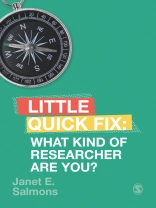Helping readers understand their perspectives and use that understanding to inform their research approach, this Little Quick Fix will enable first time researchers to reflect upon and identify their view of truth and knowledge, as well as what those mean and how they are established. After reading they will be better placed to choose and critically evaluate appropriate research questions and make informed methodological decisions.
With activities that get readers to identify their stance and question their own and others’ assumptions about research practice, this Little Quick Fix covers questions like:
• How can you become a researcher known for integrity?
• What stand will you take towards your inquiry?
• How will you study problems as an outsider?
• How will you study problems as an insider?
• How will my research design choices communicate the kind of researcher I am?
• How can mindful self-awareness help me stay true to my intentions?
Little Quick Fix books provide quick but authoritative answers to the problems, hurdles, and assessment points students face in the research course, project proposal, or design – whatever their methods learning is.
- Lively, ultra-modern design; full-colour, each page a tailored design.
- An hour′s read. Easy to dip in and out of with clear navigation enables readers to find what they need – quick.
- Direct written style gets to the point with clear language. Nothing needs to be read twice. No fluff.
- Learning is reinforced through a 2-minute overview summary; 3-second summaries with super-quick Q&A
- DIY tasks create a work plan to accomplish a task, do a self-check quiz, solve a problem, get students to what they need to show their supervisor.
- Checkpoints in each section make sure students are nailing it as they go and support self-directed learning.
- How do I know I’m done? Each Little Quick Fix wraps up with a final checklist that allows the reader to self-assess they’ve got what they need to progress, submit, or ace the test or task.
Jadual kandungan
Section 1: What does it mean to be a researcher who acts with integrity?
Section 2: What mindsets and thinking skills do researchers need?
Section 3: What communication skills do researchers need?
Section 4: How do I collaborate fearlessly as a co-researcher or co-author?
Section 5: Why is it important to take a position in relation to my research?
Section 6: How can I achieve my goal as a respected researcher?
Mengenai Pengarang
Dr. Janet Salmons is a qualitative scholar and methodologist. She is a Fellow at the Center for Advanced Internet Studies and edits the newsletter, “When the Field is Online”. Recent books include: Doing Qualitative Research Online 2nd edition (2022), What Kind of Researcher Are You? (2021), Reframing and Rethinking Collaboration in Higher Education and Beyond: A Practical Guide for Doctoral Students and Early Career Researchers with Narelle Lemon (2021), Publishing from your Doctoral Research: Create and Use a Publication Strategy with Helen Kara (2020), Learning to Collaborate, Collaborating to Learn (2019), Find the Theory in Your Research (2019), and Getting Data Online (2019). She previously managed the Sage Research Methods Community (formerly known as Methodspace). Dr. Salmons received a B.S. in Adult and Community Education from Cornell University, an M.A. in Social Policy Studies from the SUNY Empire State College, and a Ph.D. in Interdisciplinary Studies and Educational Leadership at the Union Institute & University. She lives and works in Boulder, Colorado.Website link: www.salmons.blog












